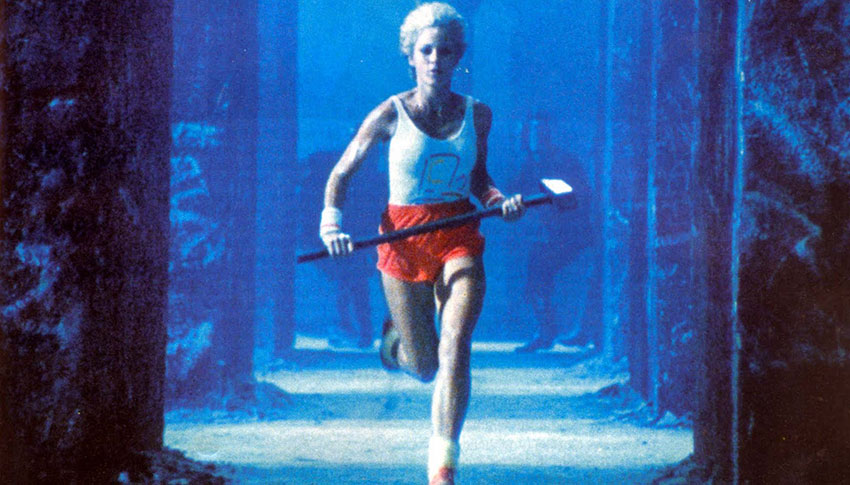 January 22, 1984: Apple’s stunning “1984” commercial for the original Mac airs on CBS during the third quarter of Super Bowl XVIII. Its dystopian theme and epic visuals pitch the Macintosh 128K as a revolutionary computer coming to smash the status quo.
January 22, 1984: Apple’s stunning “1984” commercial for the original Mac airs on CBS during the third quarter of Super Bowl XVIII. Its dystopian theme and epic visuals pitch the Macintosh 128K as a revolutionary computer coming to smash the status quo.
Probably the most famous TV ad for a computer in history, the commercial is directed by Alien and Blade Runner helmer Ridley Scott. It reaches millions of viewers during the big game. However, it very nearly didn’t air at all.
‘1984’ Mac ad: Apple advertising thinks different
Just like many Apple ads over the years, the “1984” Mac commercial didn’t waste time running through the specs of Apple’s upcoming computer. Instead, it articulated a philosophy. Apple was the young, “different thinking” upstart pitted against established giant IBM, which had recently entered the personal computer business.
The ad depicted a dreary future in which workers sit listening to a Big Brother-like figure drone on about the glories of groupthink. Then, a dissident woman (played by English athlete/actress/model/singer Anya Major) in bright red shorts takes a hammer to the authoritarian on the massive screen.
Will it air? Won’t it air? Nobody seemed sure.
Because it was so different from most computer advertisements of the time, however, Apple’s “1984” Mac commercial proved controversial. Steve Jobs and Steve Wozniak, Apple’s co-founders, loved it. Apple CEO John Sculley wasn’t so sure, although he liked the ad’s unquestionable boldness.
The Apple board of directors remained less than convinced, though.
“Can I get a motion to fire the ad agency?” Mike Markkula reportedly said. Another board member, Philip S. Schlein, the CEO of Macy’s California, supposedly said nothing, but buried his head in his hands.
The panicked board hatched a plan to sell off Apple’s Super Bowl ad slots at the last minute. On the Friday before the big game, Hertz said it would buy one 30-second block, while the H. J. Heinz Company said it would buy another. This left Apple with one minute of paid airtime, costing $800,000. With no last-minute purchasers, Cupertino decided to air the unsettling “1984” Mac commercial after all.
The Apple ad that won the Super Bowl
Ironically, considering the Super Bowl’s popularity — that year, an estimated 77.62 million people watched the Los Angeles Raiders defeat the Washington Redskins — many at Apple apparently didn’t realize the impact of airing the “1984” commercial during the big game.
Jobs said he didn’t know a single person who watched the Super Bowl. Bill Atkinson, a crucial member of the original Mac team, wasn’t a sports fan. He skipped the game altogether, waiting until Monday to find out how everything went. Other members tuned in, but just to watch Apple’s revolutionary Mac ad.
Even Steve Hayden, the writer of the commercial, missed its airing. With no interest in football, he was at home alone washing dishes when the phone rang following the groundbreaking screening. It was Jay Chiat, founder of the agency that created Apple’s “1984” commercial.
“How does it feel to be a fucking star?” Chiat screamed down the line.
“Great,” said Hayden, still baffled at the turnaround from love-to-hatred-and-back-to-love-again that the ad received. “Just don’t ask me to do this next year.” (Unfortunately for Apple, a “1984” sequel — a similarly dystopian ad called “Lemmings” for The Macintosh Office — stunk up the Super Bowl in 1985.)
‘1984’ Mac commercial is Apple’s greatest ad ever — but the sequel bombed
In the years since then, many companies and TV shows have parodied or paid homage to Apple’s watershed “1984” commercial. In 2004, with the ad celebrating its 20th anniversary, Apple released an updated version, in which the heroine wore an iPod on her belt.
And in 2020, Fortnite developer Epic Games — deep into a legal battle with Apple over App Store rules — released a sarcastic version that cast Cupertino as the big, bad establishment. (Ridley Scott said he was unimpressed.)
As great as some of Apple’s other marketing has been, the “1984” Mac commercial remains the company’s crowning achievement when it comes to advertising. It set the Macintosh 128K, which shipped just two days later, on the path to success.



One response to “Today in Apple history: Super Bowl Mac ad airs against the odds”
Thanks for the note — found another version and updated the post!
https://youtu.be/9pTHlG8USUg